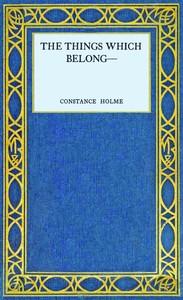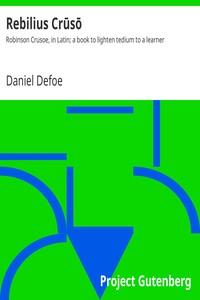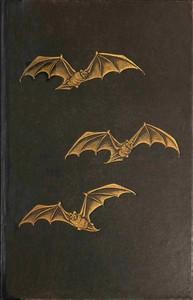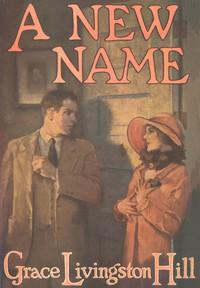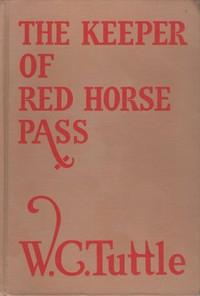|
|
Read this ebook for free! No credit card needed, absolutely nothing to pay.Words: 49493 in 15 pages
This is an ebook sharing website. You can read the uploaded ebooks for free here. No credit cards needed, nothing to pay. If you want to own a digital copy of the ebook, or want to read offline with your favorite ebook-reader, then you can choose to buy and download the ebook.

: The things which belong— by Holme Constance - England Fiction; Spouses Fiction; Canada Emigration and immigration Fiction; Older couples Fiction@FreeBooksThu 08 Jun, 2023 Commentator: Edward N. Hooker No. 2 With an Introduction by Edward N. Hooker Membership in the Augustan Reprint Society entitles the subscriber to six publications issued each year. The annual membership fee is .50. Address subscriptions and communications to the Augustan Reprint Society, in care of one of the General Editors. INTRODUCTION His literary criticism is small in bulk. But though it is neither brilliant nor well written , it is not without interest. Pope observed in 1730 that he was a "learned" man . The observation was correct, but it should be added that Wesley matured at the end of an age famous for its great learning, an age whose most distinguished poet was so much the scholar that he appeared more the pedant than the gentleman to critics of the succeeding era; Wesley was not singular for erudition among his seventeenth-century contemporaries. He loved the quietness. He loved being shut in on the top of his hill, and would have been only the better pleased if there had been thirty barriers about him instead of three. This was the time when the place was wholly his, before his staff stirred in the bothy or climbed the hill from the park. The men, when they came, had an air of possession even in their tread, and in the way they handled things and struck spades into the soil. It was natural, of course, but he felt that it robbed him a little. He had to share the gardens with them. His employers had the possessive air, too, although not so much as the men, both because they knew their place better and because they did not strike tools into the ground. But he had to share the gardens with them, all the same. They said: "What are you going to grow just here, Kirkby?" Or: "Don't you think we might have so-and-so, this year, instead of this-and-that?" So they robbed him, too. He was old and gentle, like an English garden, but he was hale, too, and not by any means run to seed. His clothes, good clothes, now pleasantly shabby, had a mellow tone which blended softly with their setting. His fresh complexion and faded but clear eyes had the pale tints of some of his own blossoms. The very droop of his shoulders was less like the slow curve which comes with age than the gentle stoop of a flower. Especially he loved the quietness because it was at this hour that he had a vision of the gardens as he planned them for the year. This was his creative time, these few moments before the men came and broke and scattered his thoughts. It was then that he saw the long succession of colours and kinds with which the gardens would sum up their rich total before the winter came again. He would lose some of it later, of course, owing to other people's follies and fancies, and the stolid frustration of concrete facts. But some of it would persist, even through worries and contradictions and the hard blows of the northern weather; so that, by the time the resting-months for the gardens came round once more, he would always in some measure have fulfilled his dream. He was not always able to snatch these god-like moments in which he controlled the future. Often enough, Mattie was downstairs first, and he could not call up his pictures while she was working and talking. Husbands and wives were so near to each other that they got in each other's way over things like those,--things that had to have you all to themselves, or they would not come. But he always took his moments when he could get them, because he needed them. His days were poorer without them and the assurance they brought him, as days are poorer without a prayer. And just now was the time when the vision was strongest and clearest, when there was promise of new life all around, and still it was only promise. Like all artists, he saw his creation best when there was still nothing but a blank page in front of him. It had then a clarity, a sweep, a combined passion and restraint which it never achieved again after he had once begun to work upon it. It altered, no matter how he tried to preserve it. Alien ideas crept in, upsetting the balance of his scheme. Beautiful ideas they were, too, sometimes, but they were alien, nevertheless. Often he had tried to convince himself that the altered plan was all for the best; but as soon as the springtime both of the gardens and of his inspiration came round again, he knew that the thing which he saw then was the finer and purer. The whole panorama of the seasons passed in colour and shape before his inward eye, running at the same time through his brain like a well-known piece of music. Familiar as it was, however, it was also highly intricate, with its many different parts overlapping and intertwining. Not only was there the kitchen garden to think of, but there were the glass-houses as well, fruit grown inside and out, tomatoes, orchids, carnations, violets. Then down at the Hall there were the rose-gardens and lawns, tennis-courts and flower-borders, and the long yew and beech-hedges to be kept trim and close. And besides all these there was the big rock-garden across the river, full of plants which, however much you might suppress them, grew as giants grow in a single night. Free books android app tbrJar TBR JAR Read Free books online gutenberg More posts by @FreeBooks
: Rebilius Crūsō by Defoe Daniel Newman Francis William Translator - Shipwreck survival Fiction; Islands Fiction; Crusoe Robinson (Fictitious character) Fiction; Atlantic Ocean Fiction; Adventure stories; Castaways Fiction; Latin language Readers@FreeBooksThu 08 Jun, 2023

: The attaché at Peking by Redesdale Algernon Bertram Freeman Mitford Baron - China Description and travel; Redesdale Algernon Bertram Freeman-Mitford Baron 1837-1916 Travel China; China Politics and government 19th century@FreeBooksThu 08 Jun, 2023
|
Terms of Use Stock Market News! © gutenberg.org.in2025 All Rights reserved.

